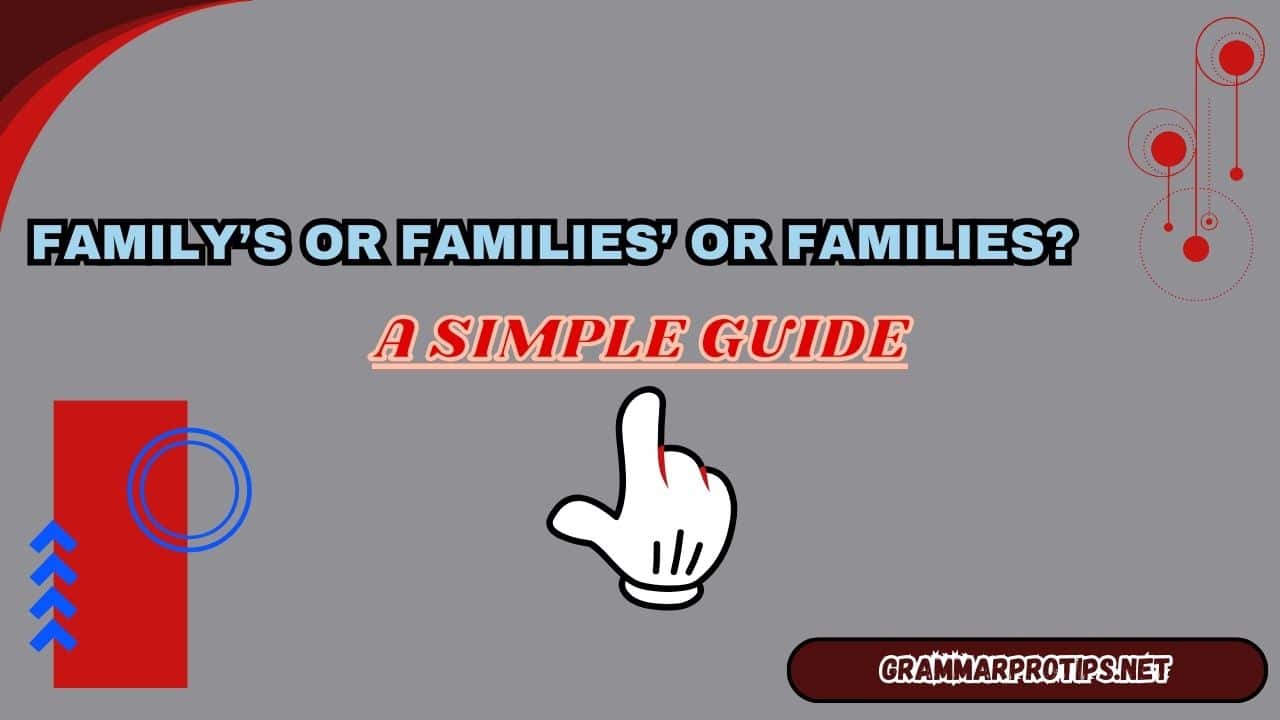English grammar can be tricky, especially when it comes to possessive forms. A common source of confusion is whether to use family’s, families’, or families.
These terms might seem similar, but they serve different grammatical purposes. In this guide, we will explore when to use each form and provide you with clear examples and rules to follow.
By the end of this guide, you’ll have a solid grasp of how to use family’s, families’, and families correctly in everyday writing.
Table of Contents
- Understanding Possessive Forms
- Singular Possessive vs. Plural Possessive
- When to Use Family’s
- Singular Possession
- Examples and Scenarios
- When to Use Families’
- Plural Possession
- Examples and Scenarios
- When to Use Families
- Plural Form (No Possession)
- Examples and Scenarios
- Common Grammar Mistakes to Avoid
- Possessive Apostrophe Errors
- Confusing Singular and Plural Possession
- Clear Communication and Correct Apostrophe Usage
- The Role of Apostrophes in Writing
- Real-World Scenarios and Examples
- Emails, Letters, and Everyday Conversations
- Summary and Final Tips for Mastering Possessives
Understanding Possessive Forms: Singular vs. Plural Possessive
Before diving into the specifics of family’s, families’, and families, it’s essential to understand the general rules behind possessive forms.
English has distinct ways of showing possession, depending on whether you’re dealing with a singular or plural noun.
Singular Possessive
A singular possessive indicates that one person, group, or thing owns something. The standard way to form a singular possessive is by adding an apostrophe + s at the end of the noun.
Example:
- John’s book (The book belongs to John)
- The family’s home (The home belongs to one family)
Plural Possessive
A plural possessive shows ownership by more than one person, group, or thing. For most regular plural nouns, you add an apostrophe after the s.
Example:
- The teachers’ lounge (The lounge belongs to multiple teachers)
- The families’ cars (The cars belong to multiple families)
When to Use Family’s: Singular Possession
The word family’s is used when talking about something belonging to one family.
This is a singular possessive form, meaning only one family owns or controls the object in question.
Rules for Using Family’s:
- Add an apostrophe + s after the noun family to indicate possession by one family.
- Use family’s to show that one family owns or is associated with something.
Examples and Scenarios
| Sentence Type | Example | Explanation |
|---|---|---|
| Subject: Confirmation of the Family’s Reservation Dear Mrs. Miller, I wanted to confirm that the Miller family’s reservation for next Saturday is all set. | Family’s shows that the reservation belongs to one family (the Miller family). | |
| Formal Letter | The family’s decision was based on their long-term plans. | Family’s indicates that the decision was made by one family. |
When to Use Families’: Plural Possession
Families’ is the plural possessive form of family. This form is used when you’re referring to something that belongs to multiple families.
Rules for Using Families’:
- Add s after family to make it plural (families).
- Add an apostrophe after the s to show possession by multiple families.
Examples and Scenarios
| Sentence Type | Example | Explanation |
|---|---|---|
| Subject: Invitation to the Families’ Annual Picnic Dear Mr. Robinson, We are inviting you and all the other families’ members to our annual picnic. | Families’ shows that the picnic involves multiple families. | |
| Formal Letter | The families’ contributions helped fund the community project. | Families’ shows possession, indicating that the contributions belong to multiple families. |
When to Use Families: Plural Form (No Possession)
The word families is simply the plural form of family. It refers to more than one family, without indicating that they own or possess something.
Rules for Using Families:
- Use families when referring to multiple families, without showing possession.
- Families is used in a plural sense to describe a group of families.
Examples and Scenarios
| Sentence Type | Example | Explanation |
|---|---|---|
| Subject: New Families in the Neighborhood Dear Mr. Thomas, Several families have recently moved into the neighborhood. | Families simply refers to more than one family without showing possession. | |
| Formal Letter | There are many families who have expressed interest in the new housing development. | Families here does not indicate possession, just referring to multiple families. |
Common Grammar Mistakes to Avoid
While the rules for using family’s, families’, and families are simple, there are a few common mistakes that people often make.
Here are some of the most frequent errors and how to avoid them:
1. Confusing Singular and Plural Possessive
Many people mistakenly confuse family’s (singular possessive) and families’ (plural possessive). Here’s a simple guide:
- Family’s = Possession by one family
- Families’ = Possession by multiple families
Incorrect: The families’s donations were generous.
Correct: The families’ donations were generous.
2. Omitting the Apostrophe
Another common mistake is forgetting to use the apostrophe when indicating possession.
Incorrect: The families cars are parked outside.
Correct: The families’ cars are parked outside.
Remember, the apostrophe is essential to indicate that something belongs to the families.
3. Using the Wrong Form When Referring to Ownership
Sometimes, people use the wrong form when referring to possession or ownership.
Incorrect: Family’s decided to take a vacation.
Correct: The family decided to take a vacation.
Here, family’s isn’t needed because we’re not indicating possession just referring to one family making a decision.
Clear Communication and Correct Apostrophe Usage
The role of the apostrophe in showing possession is vital for clear communication.
Incorrect apostrophe usage can confuse your readers and obscure the meaning of your sentences.
That’s why it’s essential to understand the rules for possessive nouns and apply them correctly in your writing.
For example:
- The family’s house = The house belongs to one family.
- The families’ houses = The houses belong to multiple families.
Always be mindful of where you place the apostrophe, as it plays a key role in grammatical precision.
Real-World Scenarios and Examples
Let’s look at some more real-life examples to help solidify the concept.
Scenario 1: Family Reunion
- The family’s reunion will take place in the park on Saturday.
This refers to the event belonging to one family.
Scenario 2: Organizing a Community Event
- The families’ involvement in the event was remarkable.
This refers to the participation of multiple families.
Scenario 3: Describing the Local Community
- There are several families living in the neighborhood.
This is a simple reference to multiple families, with no possession involved.
Summary and Final Tips for Mastering Possessives
To wrap up, the difference between family’s, families’, and families may seem subtle, but it’s important to get it right for clear writing and effective communication.
Key Takeaways:
- Family’s = Singular Possessive: Something that belongs to one family.
- Families’ = Plural Possessive: Something that belongs to multiple families.
- Families = Plural Form: Refers to multiple families, but does not indicate possession.
By following these guidelines, you’ll be able to avoid common grammar mistakes and ensure that your writing is grammatically correct and easy to understand.
Pro Tip: Always check your apostrophe placement to ensure you’re showing possession correctly.
Whether you’re referring to one family or multiple families, the correct use of apostrophes ensures clarity in your writing.
Read more knowledgeable blogs on Grammar Pro Tips

Sienna Mauldon is a passionate writer and grammar expert. On her blog, she shares easy-to-follow guides to help readers master grammar rules and improve their writing. With a love for language and teaching, Sienna makes grammar simple and fun for everyone, from beginners to experienced writers.








